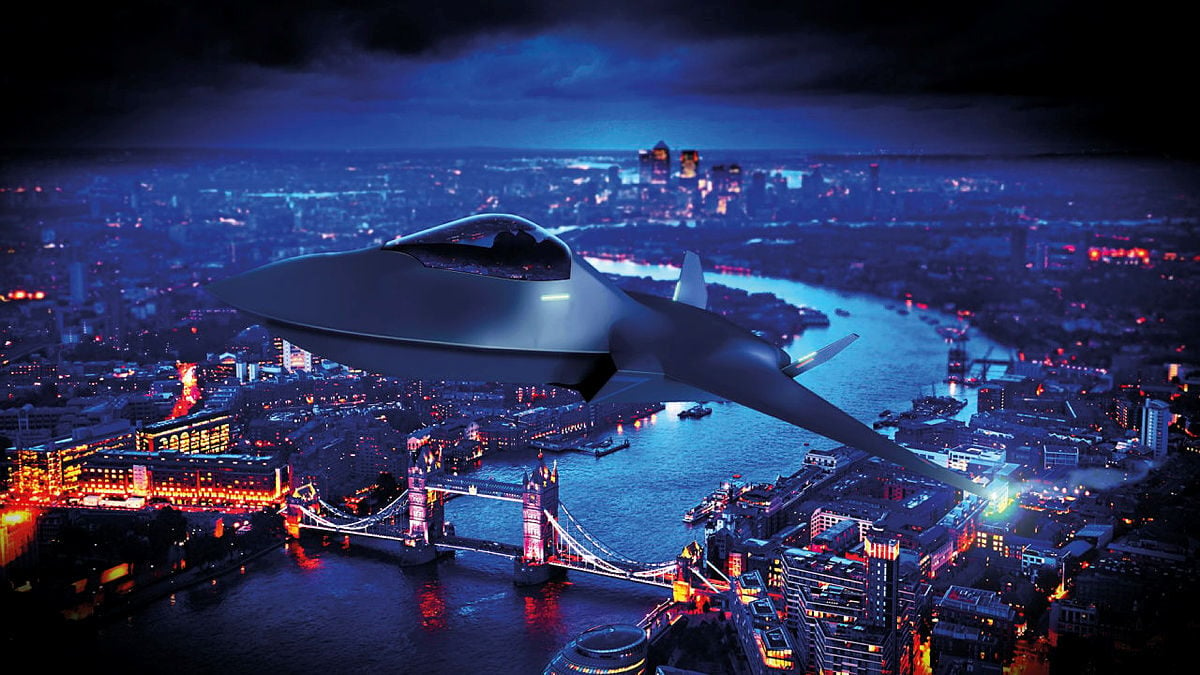
A mock up Image of the proposed Team Tempest Future Combat Air System concept. (UK MoD)
Updated 3/1/23 at 8:16 pm EST: The original headline and story reflected a statement from the Kingdom of Saudi Arabia that, as part of a new military agreement with Britain, it was taking part in the Future Combat Air System (FCAS) program. Hours after publication, the UK put out a statement which disputed that the Saudis would have any role in FCAS. This story has been updated throughout to reflect the new information.
BELFAST — The Kingdom of Saudi Arabia announced on Wednesday it would be joining the UK-led Future Combat Air System (FCAS) program, only for the United Kingdom to walk that statement back hours later.
UK minister of defense Ben Wallace and Kingdom of Saudi Arabia minister of defense Khalid bin Salman jointly signed a military joint statement in Riyadh. On social media, bin Salman said “We signed a declaration of KSA’s intent to participate in the Future Combat Air System program (FCAS) which will strengthen KSA’s defensive capabilities through a comprehensive partnership that includes joint production and R&D projects for future air systems.”
In an Arabic piece from the Saudi Press Agency, translated for Breaking Defense, that line was echoed by saying “The Saudi Minister of Defense signed a letter of intent with his UK counterpart regarding the Kingdom of Saudi Arabia’s participation in the Future Air Capabilities Program (FCAS), which includes defining a comprehensive and joint vision for the future partnership for air combat operations, exploring the partnership that provides the required capabilities needs, and defining industrial participation projects and joint research and development projects.”
Hours after the announcement was made from the Saudi side, the UK issued a statement that what Wallace signed was a Statement of Intent “which will initiate a Partnering Feasibility Study to explore how we can best position our decades long combat air relationship for the future. Both Governments confirmed a common desire for closer industrial collaboration, to develop key capabilities and boost prosperity in both nations, including in support of Saudi Vision 2030 objectives.”
More importantly, the press note highlighted to reporters that the agreement is “distinct from the UK-IT-Japan GCAP, or FCAS programmes.”
FCAS, a joint effort by the UK, Italy and Sweden, was originally designed to explore future aviation technologies, including the Tempest next generation fighter program. However, thanks to the complicated way the UK has structured its next-gen fighter efforts, today’s agreement does not seem to link the Saudis to the Global Combat Air Programme (GCAP), a fighter under development to replace Royal Air Force Eurofighter Typhoons and Japan Air Self-Defense Force F-2 aircraft. The UK, Italy and Japan, without Sweden, are teamed on GCAP.
In essence, the Tempest and GCAP efforts are distinguished by an ambition to field a Tempest prototype by 2027 and a GCAP fully fledged sixth-generation fighter jet by 2035.
Still, while the UK is shooting down Saudi membership in FCAS or GCAP now, the joint declaration “to explore how we can best position our decades long combat air relationship for the future” would seem to leave the door open for a future agreement on those programs — and if those programs were discussed as future potential options, that could be at the root of today’s confusion.
What hypothetical industrial contribution KSA could make to FCAS is unclear from bin Salman’s vague reference to “joint production.” It could be a vote of confidence in Saudi attempts to improve their domestic production capabilities, as the Middle East power has traditionally been more of a pure customer than a program partner for Western-made weaponry.
The UK has previously supplied KSA with a fleet of 72 Eurofighter Typhoons, though an additional order for 48 aircraft has been on hold since the signing of a memorandum of understanding in 2018 and a subsequent year long ban on exporting military equipment to Riyadh, after the court of appeal in London ruled such sales were unlawful and amid Saudi-led coalition airstrikes killing civilians in Yemen. The export ban was lifted in July 2020.
Agnes Helou in Lebanon contributed to this report.
In a ‘world first,’ DARPA project demonstrates AI dogfighting in real jet
“The potential for machine learning in aviation, whether military or civil, is enormous,” said Air Force Col. James Valpiani. “And these fundamental questions of how do we do it, how do we do it safely, how do we train them, are the questions that we are trying to get after.”


























